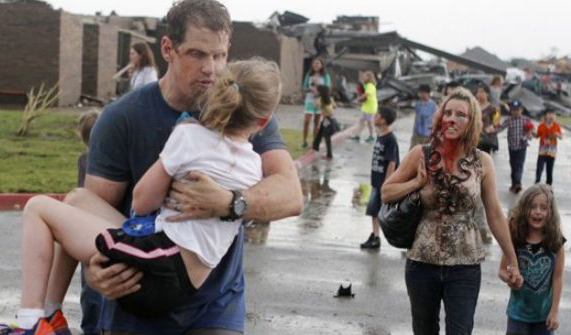
Houston/Washington, May 21: Over 90 people, including 20 children, were killed after a monstrous tornado ripped through the US city of Oklahoma, flattening entire neighbourhoods, crushing two elementary schools and turning the area into a war-zone.
The tornado, over a mile wide, ripped through the area yesterday with winds of up to 320 km/h.
Worst hit was Moore, south of the city, where neighbourhoods were flattened and two elementary schools destroyed.
The Oklahoma City Medical Examiner said at least 91 people died, including children, in the tornado and that they expect the death toll to climb.
Two hospitals confirmed they were treating a total of 145 injured, including about 70 children.
The Moore City Police Department said it was impossible to put a final number on fatalities because there was still so much area to search, but officials expected the worst.
"Our hearts are broken for parents who are wondering about the state of their children," said Governor Mary Fallin said.
US President Barack Obama has declared a State of Emergency in Oklahoma and had dispatched federal aid. He spoke with Oklahoma Governor to express his concern for those who have been affected by the severe weather.
The twister, one of several created by a storm system that swept through nation's midsection the past 36 hours, reduced homes and building to rubble.
Fallin deployed 80 National Guard members to assist with rescue operations and activated extra highway patrol officers.
The tornado stayed on the ground for 40 minutes and travelled 32 kilometres.
Several children were pulled alive from the rubble of Plaza Towers Elementary, but there were no immediate reports of rescues or casualties at another school.
Rescuers are "going house to house and block to block to try and find any survivors that are out there and trapped," said state emergency management spokesman Jerry Lojka.
"We can only imagine that there are still many others there that are unaccounted for," he said.
Lojka said emergency management officials were working from an underground command center in Oklahoma City and did not yet know how many students were in the two elementary schools in Moore that were destroyed.
One emergency responder on the scene who helped a couple of individuals with lacerations on the back and head, as well as an individual with a spine injury, said, "People are crawling from everywhere and anywhere, It's basically just a war zone."
This was the second worst tornado to hit Moore was since 1999 when 36 people were killed. The storm had the highest winds ever recorded near the earth's surface.
Tornadoes were also reported Sunday in Iowa, Kansas and Oklahoma as part of a storm system that stretched from Texas to Minnesota.
The National Weather Service said it was tracking "a large and extremely dangerous tornado" just west of Moore. The storm was moving to the northeast, and forecasters said they expected "large, destructive hail up to tennis ball size."
Local media reported heartbreaking scenes in the tornado hit areas.
"This tornado is being compared to the devastating, record-breaking May 3, 1999 tornado that ravaged the same area years ago," local KFOR news channel said.
"This is war-zone terrible," Jon Welsh, a helicopter pilot for KFOR who lives in Moore, said while surveying the damage from the air.
"This school is completely gone," he added.
A KFOR reporter also said four bodies, including that of a seven-month-old baby, were pulled from a 7-Eleven.
Search and rescue operation were going on till late in the night. A teacher told KFOR that she lay on top of six students in the bathroom. All of them were rescued.
With a population of 55,000 according to the 2010 census, Moore is the seventh largest city in Oklahoma.





Comments
Add new comment